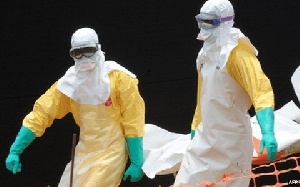The British government must ensure better accounting for aid to Liberia and Sierra Leone, two of the three West African countries that are in the throes of the deadly Ebola virus, which has killed over 3,300 people.
MPs in the British parliament’s International Development Committee said they were surprised to discover during a recent visit to Liberia that only $3.9 million out of $60 million given by the European Union (EU) to support the health sector in the country was passed on by the country’s Ministry of Finance over a two-year period.
“This failure placed many of the gains made by earlier DfID [Department for International Development] programmes at risk and left the Liberian health system struggling even before Ebola struck,” the Committee said.
“The spread of Ebola has clearly demonstrated the importance that governments of developing countries need to attach to health system spending.
“We have to ask whether Liberia would have dealt better with the original outbreak and prevent its spread had $56 million from the EU been spent as intended by the Liberian Ministry of Finance on its health system.
“DfID donates 16 per cent of its total budget via the EU, so ministers must take a closer interest in where UK money is going and whether it is being spent as intended. Yet neither the EU itself nor DfID seem to be concerned about how much of the work they recently funded has been undone through this failure to distribute ongoing support,” the Committee added.
“DfID must generate accurate figures for overall UK aid spending directed through centrally managed, multilateral and bilateral programmes to Liberia and Sierra Leone. The Committee was appalled that the Department could not provide an overall figure for its total spend in Sierra Leone.
“As DfID increases the proportion of funding channelled through centrally managed programmes run from the UK, it must ensure such programmes are better connected to bilateral country offices to improve design, oversight, delivery and outcomes. The Independent Commission on Aid Impact should look into the operation and accounting of DfID centrally managed programmes,” the Committee said.
However, the Committee said that aid to Liberia and Sierra Leone should be reinstated rather than cut, arguing that the Ebola crisis in these two countries could be linked directly to falling levels of international aid.
In their wide-ranging report looking at both Liberia and Sierra Leone, MPs noted: “Each country has made significant progress over the past decade, but both remain at a critical juncture where it is likely to take at least a generation of sustained support to secure lasting benefits. To that end UK aid spending to this region should not be cut.”
Sir Malcolm Bruce, Chairman of the Committee, said: "The scale of the Ebola crisis now unfolding in Sierra Leone and Liberia may well be connected to declining levels of international support for health system improvements in what remain two of the poorest and least developed countries in the world.”
The Committee said that in the midst of “this devastating epidemic, and at a time when the UK has reached its 0.7 per cent target for overseas development assistance, it is wrong for the UK to cut its support to these two countries by nearly a fifth”.
The Committee added: “The planned termination of further UK funding to the Liberian health sector is especially unwise.”
Noting that DfID had assisted Sierra Leone and Liberia as they recovered from their civil wars, the Committee said: “We believe that this work should continue through bilateral aid programmes.
“However, UK ministers must now work harder to track the use of sector support given to Liberia and Sierra Leone through multilaterals we help fund,” the Committee said.
In the interim, DfID has been providing extra support to counter the virus, with many members of staff of the country’s National Health Service (NHS) volunteering to go to Sierra Leone.
Health News of Wednesday, 8 October 2014
Source: GNA

















